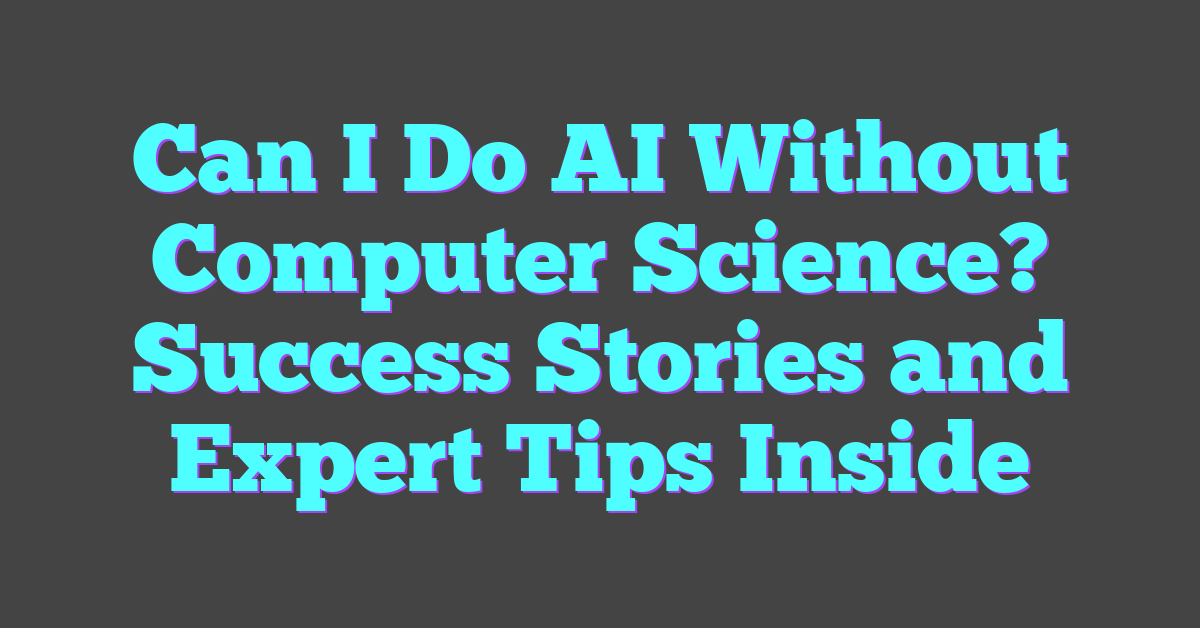Artificial Intelligence (AI) is no longer a distant sci-fi concept; it’s part of our daily lives, from virtual assistants to recommendation algorithms. But what if you’re fascinated by AI and don’t have a degree in computer science? Is it still possible to dive into this exciting field?
The good news is, you don’t need a computer science background to start exploring AI. With the abundance of online resources, bootcamps, and community forums, anyone with curiosity and dedication can learn the basics and even contribute to AI projects. Let’s explore how you can embark on an AI journey without a traditional tech degree.
Exploring AI Without a Computer Science Background
Many wonder if diving into Artificial Intelligence (AI) is feasible without a computer science background. With the right resources and dedication, it’s entirely possible.

Understanding the Basics of AI
AI encompasses various fields, including machine learning, natural language processing, and computer vision. One can begin by studying introductory courses on platforms like Coursera, edX, and Udacity. These courses often cover essential topics like supervised learning, unsupervised learning, and neural networks. For example, Andrew Ng’s “Machine Learning” course on Coursera provides a strong foundation for newcomers.
Besides structured courses, books like “Artificial Intelligence: A Modern Approach” by Stuart Russell and Peter Norvig offer comprehensive insights into AI principles. Reading blogs and watching tutorials enhances understanding and keeps one updated with the latest trends.
Relevant Skills for AI Outside Computer Science
Several skills are crucial for AI, even outside computer science. Mathematics, particularly linear algebra, probability, and statistics, plays a significant role. Understanding linear equations, probability distributions, and statistical methods aids in grasping machine learning algorithms.
Programming skills are also essential. Python is widely used in AI projects due to its simplicity and extensive libraries like TensorFlow and PyTorch. One can learn Python through online tutorials and coding exercises.
Data handling is another critical skill. Knowledge of how to collect, clean, and analyze data is vital. Tools like Pandas and NumPy assist in data manipulation, while visualization tools like Matplotlib present data insights effectively.
Soft skills, including problem-solving, critical thinking, and continuous learning, are equally valuable. Engaging in AI communities, participating in hackathons, and contributing to open-source projects foster these abilities. For instance, platforms like Kaggle offer competitions that help in practical learning and skill enhancement.
By integrating these skills, individuals can pursue AI careers without needing a formal computer science degree. Engaging with available resources, continuous learning, and practical application form the pathway to success in this field.
Alternative Learning Paths for AI Enthusiasts
AI enthusiasts can explore numerous routes to gain expertise, even without a computer science degree. These alternative paths provide flexibility and access to diverse learning resources for aspiring professionals.
Online Courses and Bootcamps
Numerous online courses and bootcamps offer structured AI education. Platforms like Coursera, Udacity, and edX provide comprehensive AI courses from top universities. For example, Andrew Ng’s “Machine Learning” course on Coursera delivers in-depth knowledge of algorithms and practical application.
Bootcamps like General Assembly and Springboard provide immersive experiences with mentorship and project-based learning. They focus on hands-on skills, coding exercises, and real-world AI projects, which can be more engaging and impactful for learners.
Community and Open Source Contributions
Involvement in AI communities and open-source projects offers real-world experience and networking opportunities. Engaging with platforms like GitHub allows enthusiasts to contribute to existing AI projects, where they can learn collaborative coding and development practices.
Participating in forums like Reddit’s r/MachineLearning or joining AI-focused Slack groups can help individuals stay updated with the latest trends and research. These communities also provide support and feedback, crucial for continuous improvement.
Key Tools and Technologies in AI
Artificial Intelligence (AI) relies on a set of robust tools and technologies. These tools simplify the implementation of complex AI models and accelerate the learning process for beginners and experts alike.
Programming Languages Essential for AI
Python
- Versatile language, extensive libraries for AI, such as NumPy and TensorFlow.
- Simple syntax, suitable for beginners.
R
- Excellent for statistical analysis and data visualization.
- Extensive package ecosystem, strong in academic research.
Java
- Popular in large-scale deployments.
- Robust community support, integration capabilities.
Julia
- High-performance, suitable for numerical computing.
- Combines ease of use with speed, ideal for AI research.
AI Frameworks and Libraries
TensorFlow
- Open-source library by Google, widely used for deep learning.
- Offers flexible architecture, supports GPUs and TPUs.
PyTorch
- Developed by Facebook, favored for research and production.
- Dynamic computation graph, ease of debugging.
Keras
- High-level neural networks API, runs on top of TensorFlow.
- User-friendly, suitable for rapid prototyping.
Scikit-learn
- Powerful library for traditional machine learning algorithms.
- Comprehensive documentation, integration with other Python libraries.
OpenCV
- Focuses on computer vision.
- Provides tools for image processing, supports real-time applications.
Microsoft Cognitive Toolkit (CNTK)
- Deep learning toolkit by Microsoft.
- Efficient in speech, image, and text-processing tasks.
Each of these tools and technologies equips AI enthusiasts with the capability to build, train, and deploy sophisticated AI solutions. Whether using Python or exploring TensorFlow, learners have abundant resources to advance their skills.
Insights from Professionals in AI Without Computer Science Degrees
Many professionals in AI have demonstrated that a computer science degree is not essential for success in the field. Their stories and advice offer valuable insights and motivation for those considering a similar path.
Case Studies and Success Stories
Several notable figures have entered the AI field without traditional computer science backgrounds:
- Jeremy Howard – A leading figure in AI, he started as a philosophy major before venturing into AI. He leveraged online resources and participated in AI competitions, eventually co-founding Fast.ai, which now offers practical AI courses to a broad audience.
- Tess Posner – Her background is in education, not computer science. She transitioned into AI by focusing on AI’s societal impacts and ethics. She’s now the CEO of AI4ALL, a nonprofit that promotes diverse AI education among underrepresented groups.
- Rachel Thomas – With degrees in math, she co-founded Fast.ai with Jeremy Howard. Her focus on making AI accessible to everyone highlights the impact non-traditional backgrounds can have in the field.
Expert Advice on Building a Career in AI
Professionals offer several tips for those aiming to build a career in AI without a computer science degree:
- Learn the Basics – Emphasize core skills like mathematics and programming. Python is particularly recommended for its extensive use in AI and seamless integration with libraries like TensorFlow and Keras.
- Practical Experience – Engage in projects and competitions on platforms like Kaggle. These experiences develop problem-solving skills and provide a portfolio of real-world applications.
- Continuous Learning – Utilize online courses and resources such as Coursera, edX, and Fast.ai. Regular practice and staying updated with the latest research and trends remain crucial.
- Networking – Join AI communities and forums, attend conferences, and participate in meetups. Networking helps in sharing knowledge, finding mentorship, and staying inspired.
Professionals stress that passion, persistence, and proactive learning can pave the way to success in AI, even without a computer science degree.
Conclusion
AI is more accessible than ever, even for those without a computer science background. With the right tools, resources, and a focus on essential skills, anyone can dive into this exciting field. Success stories like those of Jeremy Howard, Tess Posner, and Rachel Thomas show that passion and persistence can lead to remarkable achievements. By embracing continuous learning and actively engaging with the AI community, individuals can carve out a fulfilling career in AI. Remember, it’s not about where you start but how dedicated you are to the journey.
Frequently Asked Questions
Can I learn Artificial Intelligence without a computer science degree?
Yes, you can. Many people have successfully learned AI through various online resources, self-study, and practical experience.
What essential skills are needed to start learning AI?
Basic understanding of mathematics, particularly linear algebra, probability, and statistics, along with knowledge of programming languages like Python is essential.
What are some good learning paths for AI enthusiasts without a computer science background?
Online courses, coding boot camps, and self-paced tutorials from platforms like Coursera, edX, and Udacity can be very effective.
Are there any success stories of individuals in AI without computer science degrees?
Yes, individuals like Jeremy Howard, Tess Posner, and Rachel Thomas have made significant contributions to AI without a traditional computer science background.
What tools and technologies should I focus on learning for AI?
Key tools and technologies include TensorFlow, Keras, PyTorch, and understanding machine learning frameworks.
How can I gain practical experience in AI?
Participate in AI competitions, contribute to open source projects, work on personal AI projects, and pursue internships or volunteer opportunities.
Is continuous learning important in AI?
Absolutely. Continuous learning through online courses, conferences, workshops, and staying updated with the latest research is crucial in the AI field.
How important is networking in the AI community?
Networking is vital. Engaging with AI communities, attending meetups, and connecting with professionals can provide guidance, mentorship, and career opportunities.
What core skills should I focus on to build a career in AI without a computer science degree?
Focus on developing strong problem-solving skills, data analysis, programming proficiency, and a good understanding of AI concepts and techniques.
How important are passion and persistence in learning AI?
Passion and persistence are crucial. The field of AI is challenging and requires a dedicated and proactive learning approach to succeed.
Can someone transition into an AI career from a non-technical field?
Yes, with the right resources, dedication, and by building relevant skills, transitioning into an AI career from a non-technical field is possible.




